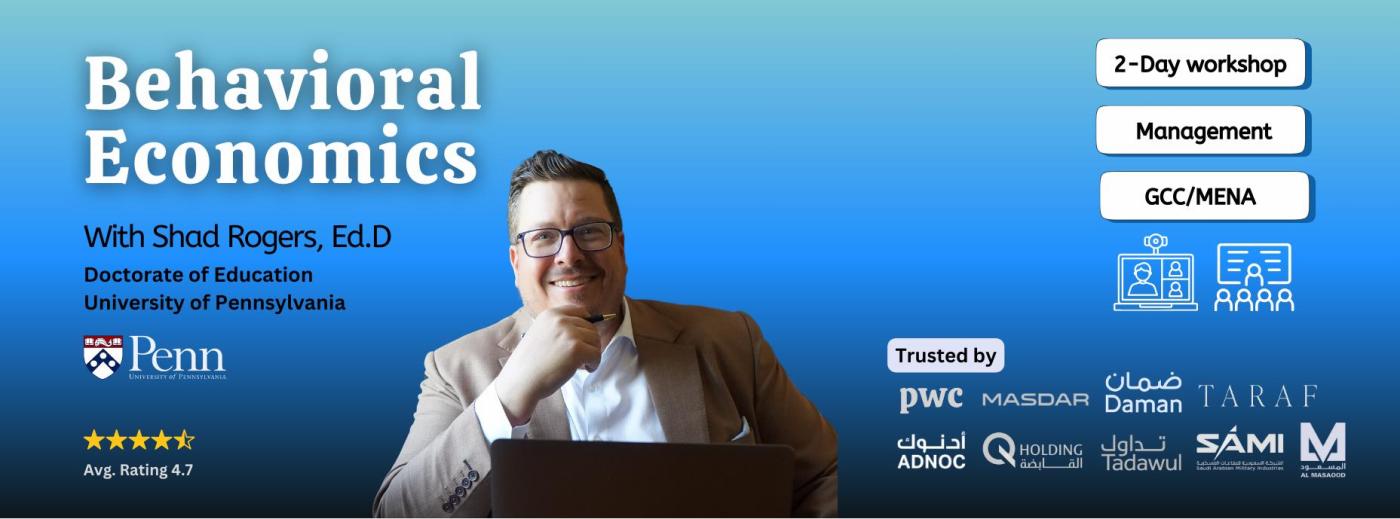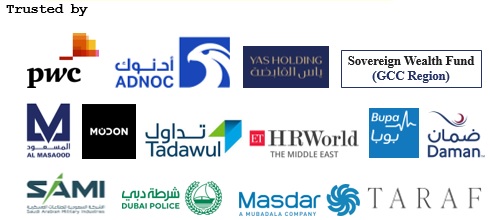Behavioral Economics workshop for Managers:
Shaping High-Performing Teams
Behavioral Economics workshop for Managers:
Shaping High-Performing Teams
Managing teams is no easy feat—cognitive biases cloud decisions, traditional motivators fall short, and resistance to change stalls progress. From fostering collaboration to navigating uncertainty, managers face complex challenges every day. This workshop equips Managers with the behavioral economics tools to tackle these hurdles head-on, transforming how they lead and drive performance.
What is Behavioral Economics?
Behavioral Economics combines psychology and incentive structures to explore how real-world decisions are shaped by biases, emotions, and social influences. Unlike traditional economics, it acknowledges that people often act irrationally, offering insights and tools to guide behavior in ways that drive better outcomes. The field was pioneered by thought leaders like Daniel Kahneman, Amos Tversky, and Richard Thaler, whose groundbreaking work on cognitive biases and decision-making laid the foundation for this transformative discipline, reshaping industries and leadership practices worldwide.
Who should attend Behavioral Economics workshop?
Behavioral Economics workshop is ideal for organizations seeking to empower their managers and leaders with cutting-edge behavioral insights. Designed for managers across all industries, it equips participants with practical tools to understand and influence human behavior, enabling them to address everyday challenges and drive organizational success. Whether for senior executives or first time managers, this course helps teams unlock their full potential through science-backed strategies.
Why is Behavioral Economics important for management?
Behavioral economics is not just a tool for individual managers—it’s a strategic asset for the entire organization. By understanding and leveraging how people make decisions, organizations can align their structures, policies, and processes with human behavior, leading to significant improvements in performance, culture, and employee satisfaction.
What will Managers learn in Behavioral Economics workshop?
Managers can use behavioral economic principles to manage their teams more effectively by understanding and leveraging the psychological factors that drive employee behavior.
Here’s how managers can leverage behavioral economics to transform their leadership approach and drive measurable impact in their teams.

How will this program benefit your organization?
This is a course in Behavioral Economics for Managers equips leaders with science-backed insights to drive organizational success by understanding the human factors behind decision-making and behavior. By fostering a workplace rooted in motivation, adaptability, and collaboration, this program enables organizations to achieve strategic goals more effectively while empowering managers to lead with greater impact.
Empowering your organization with these measurable benefits:
What will Managers learn in Behavioral Economics workshop?
Managers can use behavioral economic principles to manage their teams more effectively by understanding and leveraging the psychological factors that drive employee behavior.
Here’s how managers can leverage behavioral economics to transform their leadership approach and drive measurable impact in their teams.

How will this program benefit your organization?
This is a course in Behavioral Economics for Managers equips leaders with science-backed insights to drive organizational success by understanding the human factors behind decision-making and behavior. By fostering a workplace rooted in motivation, adaptability, and collaboration, this program enables organizations to achieve strategic goals more effectively while empowering managers to lead with greater impact.
Empowering your organization with these measurable benefits:
- Improves Decision-Making Across the Organization
- Drives Employee Engagement and Retention
- Enhances Organizational Change Efforts
- Increases Productivity and Efficiency
- Strengthens Collaboration Across Teams
- Builds a Resilient and Adaptive Organization
What research reveals: The Impact of Behavioral Economics on Employee Engagement and Decision-Making
How Behavior Economics impacts the team?
A manager skilled in behavioral economics can profoundly influence their team, fostering a more motivated, collaborative, and productive environment. By understanding and applying behavioral insights, managers can create conditions that naturally encourage positive behaviors and outcomes.



What Makes The Behavioral Economics Workshop Unique?
This course on Behavioral Economics for Managers offers a distinct approach compared to traditional management courses by focusing on how people actually behave, rather than relying on assumptions of rational decision-making or standardized leadership frameworks.
In this workshop, we teach managers how Behavioral Economics provides a distinct and practical approach to leadership, setting it apart from traditional management programs.
Behavioral Economics for Managers
Science-Backed Insights
Uses research-based principles to address biases, social influences, and team dynamics.
Focus on Real-World Human Behavior
Recognizes human behavior as irrational and provides tools for managing biases and resistance to change.
Practical Tools Over General Concepts
Introduces frameworks that drive outcomes, including Choice Architecture and Social Norms, which shape decision-making; Salience and Framing, which influence perception; and Loss Aversion, the Endowment Effect, and Hindsight Bias, which affect risk and value judgments
Emphasis on Behavioral Change
Creates environments that encourage desired behaviors naturally.
Traditional Management Programs
General Theories
Focuses on leadership strategies, communication, and technical skills.
Idealized Scenarios
Assumes people act logically and predictably in most situations.
Conceptual Skills
Focuses on broad leadership theories with limited immediate application.
Limited Focus on Change
Develops skills but often neglects the psychology behind behavior change.
Behavioral Economics for Managers
Science-Backed Insights
Uses research-based principles to address biases, social influences, and team dynamics.
Focus on Real-World Human Behavior
Recognizes human behavior as irrational and provides tools for managing biases and resistance to change.
Practical Tools Over General Concepts
Introduces frameworks that drive outcomes, including Choice Architecture and Social Norms, which shape decision-making; Salience and Framing, which influence perception; and Loss Aversion, the Endowment Effect, and Hindsight Bias, which affect risk and value judgments
Emphasis on Behavioral Change
Creates environments that encourage desired behaviors naturally.
Traditional Management Programs
General Theories
Focuses on leadership strategies, communication, and technical skills.
Idealized Scenarios
Assumes people act logically and predictably in most situations.
Conceptual Skills
Focuses on broad leadership theories with limited immediate application.
Limited Focus on Change
Develops skills but often neglects the psychology behind behavior change.
Who is the Facilitator?
Shad Rogers has a strong foundation in the principles and applications of behavioral economics, built through advanced study and research in the field. His academic focus delves into understanding human behavior and decision-making, particularly within organizational and managerial contexts.
With expertise in applying concepts like choice architecture, nudge theory, and decision-making frameworks, Shad bridges the gap between theory and practice.
This unique combination of academic rigor, practical leadership experience, and a passion for teaching makes him exceptionally qualified to lead this workshop. Participants will gain practical tools and actionable insights to tackle management challenges effectively and enhance their leadership impact.
 Abu Dhabi Investment Authority (ADIA), UAE
Abu Dhabi Investment Authority (ADIA), UAE
Head of Learning and National Development
– Lead organizational learning initiatives across the firm
– In charge of local talent development from graduate development through senior leadership programs
 Pacific Investment Management Co (PIMCO), USA
Pacific Investment Management Co (PIMCO), USA
Vice President – Learning & Development
– Lead global learning initiatives for staff of 2,600
– Focus on Portfolio Management, Product Management, Client Management, and Business Support
Associate – Business Development
 UBS, USA
UBS, USA
Advisor
– Focus on Municipals Bonds, Deep Value Equities, and Absolute Return Strategies
 University of Pennsylvania, USA
University of Pennsylvania, USA
Ranked #3 School of Education in the world, 2024
- Doctorate of Education, 2024
- Masters of Education, 2022
Pepperdine University, USA
- MBA
Vanguard University, USA
- Bachelors – Business
What is the Format of the Workshop?
In-person |
 |
| Option 1 In-Person Two-day workshop, across GCC/MENA For organizations looking to run this program as a workshop, we can deliver at the location of your choice. |
Virtual |
 |
| Option 2 Virtual: Three ½ day workshops: For organizations who have a distributed management workforce, we can facilitate in a three ½ day sessions to accommodate the workforce. |
Where and when will the workshop be held?
This workshop will be conducted throughout 2025, exclusively for organizations across the UAE, Saudi Arabia, Qatar, and other GCC and MENA region countries. Tailored to meet your organization’s needs, the sessions can be scheduled at your convenience, ensuring flexibility and accessibility for your teams.


















